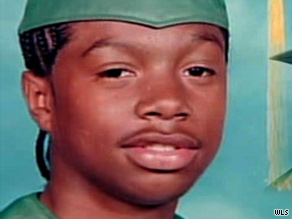Tuesday, September 29, 2009
What Makes Something Important?

Generally speaking, I blog about whatever heinous situation is dominating the news at the moment. Sometimes, that's a very easy event to spot. Generally speaking if it gets several columns on the front page of the New York Times, or more than one story on the splash page at CNN, you know it's "big." And if it's "big" and traumatic, it's stuff for the Quarterback.
Sometimes, however, it's not as obvious what is "big" in American media. Finding traumatic events is not much of a problem. Finding ones that seem compelling (and that I have something to say about) is sometimes harder. Today I had a particularly difficult time finding a story I wanted to blog about, so I started to reflect on what makes me think a story is "compelling." Sometimes the reflection isn't so pretty.
By my gut level definition, a story is compelling if it meets one or more of the following criteria, the more the better:
- the event is unusual
- the event affects people in an unusual way
- the event affects a group of people you might not think of as being affected
- the news coverage of the event raises a particularly interesting point
- the event affects people who I believe most people will identify with
There are two examples of this that became clear to me as I was desperately searching for a topic today. The first has to do with natural disasters. In my searching, I had skimmed over the deaths of hundreds of people in the Philippines during recent flooding, and decided I didn't have much to say. Somewhat later, a breaking news headline appeared detailing a very large earthquake near Samoa and a tsunami warning in New Zealand, and I caught myself thinking, "If there's a tsunami in New Zealand, then I'll have something to write about." Really? Deaths from natural disasters in the Philippines aren't compelling, but those in New Zealand are? How can I possibly assume that somehow people in the Philippines are "used" to this sort of thing?
Which brings me to my second example. Derrion Albert, 16, was beaten to death when he got caught in the conflict between two groups of students on his way home from school on Thursday. He was an honor student, a church-goer, and an innocent bystander. If this had happened in my hometown, it would be national news. But it happened in Chicago, and Derrion was black, and so it didn't make the news until a video of the beating surfaced, and we white folks could see that this is not a sort of violence you can ever "expect" or "get used to." But let's face it, privileged, suburban, white folks, of which I am one, still think of it that way.
All life is precious. We know that intellectually, but we can't seem to act like it. We distance ourselves a hundred different ways from trauma, whether to protect ourselves from the idea that it could happen to us or for more sinister reasons of racism, classism or xenophobia. If trauma happens to "those people," it doesn't happen to "us." But we are all those people, and they are all us. We probably won't make much progress in this world until we really believe that.
Subscribe to:
Post Comments (Atom)
Meet the Quarterback

- Naomi Zikmund-Fisher
- is a clinical social worker, former school Principal and a Crisis Consultant for schools and community organizations. You can learn more about her at www.SchoolCrisisConsultant.com
Contact the Quarterback
Monday Morning Crisis Quarterback on Facebook
Subscribe via email
Quarterback for Kindle
Blog Archive
-
▼
2009
(185)
-
▼
September
(28)
- Earthquakes, Tsunamis and Typhoons, Oh My!
- What Makes Something Important?
- Can We Forget for a Minute?
- The Devil You Know
- Domestic Violence and Suicide Among Our Finest
- Death By Politics, Fear By Media
- Dying on the Phone: The Georgia Floods
- Another Family Gone
- Can We Have Our Tragedy Back Now?
- Is it Ever OK to Lie to Prevent Panic?
- Do Now, Blame Later: Phillip Arnold Paul on the L...
- Sometimes trauma has a Little t
- Tashawnea Hill: Won't Somebody Think of the Child...
- Driving a Desk
- Violence on Campus
- How Do Little Kids Understand Tragedy?
- Update: Annie Le
- Annie Le's Wedding Day: Who Could We Help, and How?
- Terror(?) on the Potomac
- The Trauma of the "Other Side"
- Eight Years Out
- Stephen Farrell: Survivor's Guilt, Survivor's Anger
- Asa Hill's Legacy
- Ready, Set, Swine Flu!
- Who Owns Your Death?
- The Georgia Murders
- Sometimes a Campus Shooting is Just a Shooting
- Why Do We Care, Or Not?
-
▼
September
(28)



2 comments:
A tsunami in New Zealand is more compelling to me, because I have an online friend (with whom I chat a lot...a friend of an online friend, who I've actually _met_) who lives there. That personal connection makes it more real, to me.
Good food for thought and courageous of you to challenge yourself out loud. Leads the way for us all. - Thanks.
btw - my old college friend is from the Philippines. It was amazing to watch how Facebook played a role in people communicating with each other. What was going on, what areas to avoid. How and where to offer help. Brought it a bit closer from both the physical and cultural distance.
Post a Comment